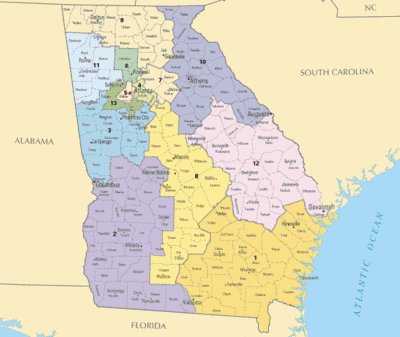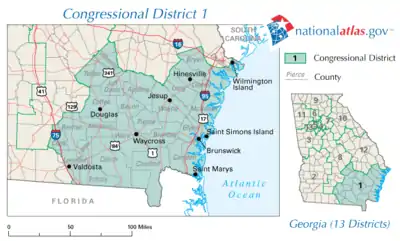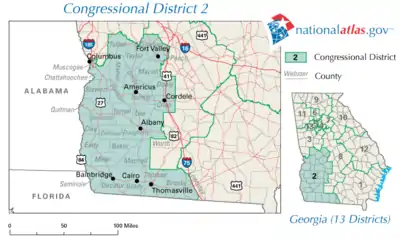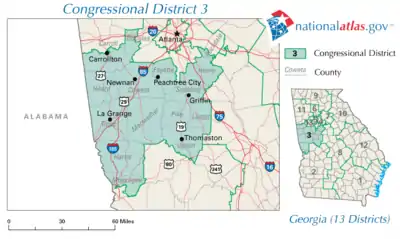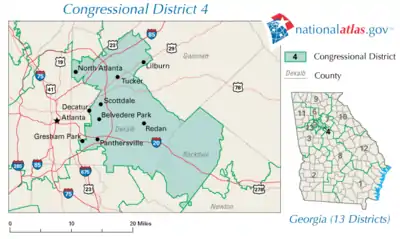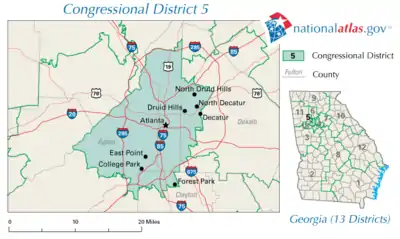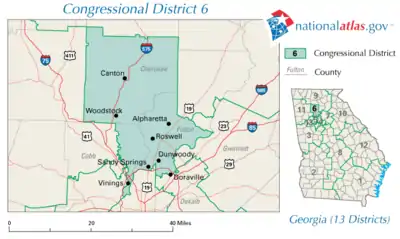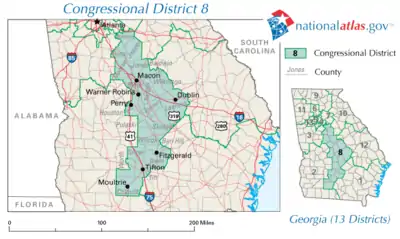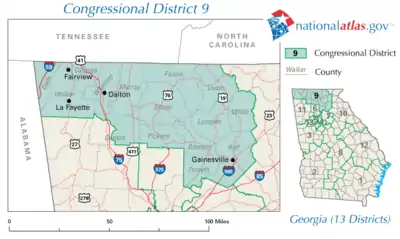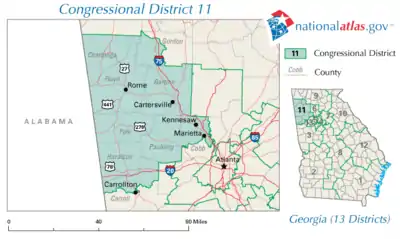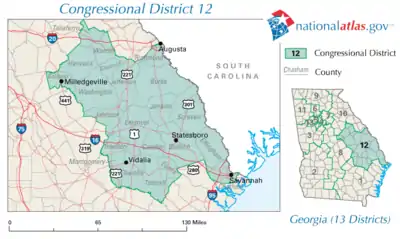2010 United States House of Representatives elections in Georgia
Elections were held on November 2, 2010, to determine Georgia's 13 members of the United States House of Representatives. Representatives were elected for two-year terms to serve in the 112th United States Congress from January 3, 2011, until January 3, 2013. Primary elections were held on July 20, 2010, and primary runoff elections were held on August 10, 2010.[1]
| |||||||||||||||||||||||||
All 13 Georgia seats to the United States House of Representatives | |||||||||||||||||||||||||
|---|---|---|---|---|---|---|---|---|---|---|---|---|---|---|---|---|---|---|---|---|---|---|---|---|---|
| |||||||||||||||||||||||||
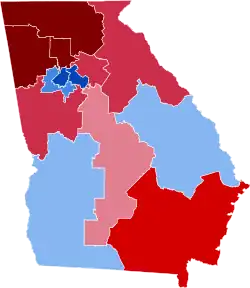
| |||||||||||||||||||||||||
| Elections in Georgia |
|---|
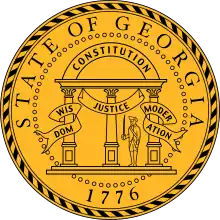 |
Of the 13 elections, the races in the 2nd and 8th districts were rated as competitive by CQ Politics,[2] The Rothenberg Political Report,[3] and Sabato's Crystal Ball,[4][5] and the 2nd, 8th and 12th districts were rated as competitive by The Cook Political Report.[6] Of Georgia's thirteen incumbents, eleven were re-elected,[7] while one (John Linder of the 7th district) did not seek re-election[8] and one (Jim Marshall of the 8th district) unsuccessfully sought re-election.[9]
In total, eight Republicans and five Democrats were elected.[7] A total of 2,468,680 votes were cast, of which 1,528,142 (61.90 percent) were for Republican candidates, 940,347 (38.09 percent) were for Democratic candidates and 191 (0.01 percent) were for write-in candidates.[10]
Overview
| United States House of Representatives elections in Georgia, 2010[11] | ||||||
|---|---|---|---|---|---|---|
| Party | Votes | Percentage | Seats Before | Seats After | +/- | |
| Republican | 1,528,142 | 61.9% | 7 | 8 | +1 | |
| Democratic | 940,347 | 38.1% | 6 | 5 | -1 | |
| Others | 191 | 0.0% | 0 | 0 | - | |
| Totals | 2,468,680 | 100.00% | 13 | 13 | ±0 | |
By district
Results of the 2010 United States House of Representatives elections in Georgia by district:[11]
| District | Republican | Democratic | Others | Total | Result | ||||
|---|---|---|---|---|---|---|---|---|---|
| Votes | % | Votes | % | Votes | % | Votes | % | ||
| District 1 | 117,270 | 71.63% | 46,449 | 28.37% | 0 | 0.00% | 163,719 | 100.00% | Republican hold |
| District 2 | 81,673 | 48.56% | 86,520 | 51.44% | 0 | 0.00% | 168,193 | 100.00% | Democratic hold |
| District 3 | 168,304 | 69.48% | 73,932 | 30.52% | 3 | 0.00% | 242,239 | 100.00% | Republican hold |
| District 4 | 44,707 | 25.33% | 131,760 | 74.67% | 0 | 0.00% | 176,467 | 100.00% | Democratic hold |
| District 5 | 46,622 | 26.28% | 130,782 | 73.72% | 0 | 0.00% | 177,404 | 100.00% | Democratic hold |
| District 6 | 198,100 | 99.91% | 0 | 0.00% | 188 | 0.09% | 198,288 | 100.00% | Republican hold |
| District 7 | 160,898 | 67.07% | 78,996 | 32.93% | 0 | 0.00% | 239,894 | 100.00% | Republican hold |
| District 8 | 102,770 | 52.70% | 92,250 | 47.30% | 0 | 0.00% | 195,020 | 100.00% | Republican gain |
| District 9 | 173,512 | 100.00% | 0 | 0.00% | 0 | 0.00% | 173,512 | 100.00% | Republican hold |
| District 10 | 138,062 | 67.36% | 66,905 | 32.64% | 0 | 0.00% | 204,967 | 100.00% | Republican hold |
| District 11 | 163,515 | 100.00% | 0 | 0.00% | 0 | 0.00% | 163,515 | 100.00% | Republican hold |
| District 12 | 70,938 | 43.41% | 92,459 | 56.59% | 0 | 0.00% | 163,397 | 100.00% | Democratic hold |
| District 13 | 61,771 | 30.57% | 140,294 | 69.43% | 0 | 0.00% | 202,065 | 100.00% | Democratic hold |
| Total | 1,528,142 | 61.90% | 940,347 | 38.09% | 191 | 0.01% | 2,468,680 | 100.00% | |
District 1
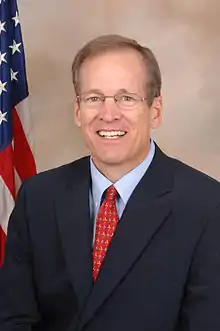
The 1st district included Hinesville and parts of Savannah and Valdosta.[12] The district's population was 68 percent white, 24 percent black and 5 percent Hispanic (see Race and ethnicity in the United States Census); 82 percent were high school graduates and 19 percent had received a bachelor's degree or higher. Its median income was $43,481.[13] In the 2008 presidential election the district gave 62 percent of its vote to Republican nominee John McCain and 37 percent to Democratic nominee Barack Obama.[12]
Republican Jack Kingston, who took office in 1993, was the incumbent. Kingston was re-elected in 2008 with 67 percent of the vote.[12] In 2010 Kingston's opponent in the general election was Democratic nominee Oscar Harris II, a farmer.[14] Both Kingston and Harris were unopposed in their respective primaries.[13]
Kingston raised $1,029,117 and spent $759,470.[15] Prior to the election FiveThirtyEight's forecast gave Kingston a 100 chance of winning and projected that he would receive 71 percent of the vote to Harris's 27 percent.[16] On election day Kingston was re-elected with 72 percent of the vote to Harris's 28 percent.[17] Kingston was again re-elected in 2012[18] and unsuccessfully ran for the U.S. Senate rather than seeking re-election in 2014.[19] He was succeeded by fellow Republican Buddy Carter.[20]
General election results
| Party | Candidate | Votes | % | |
|---|---|---|---|---|
| Republican | Jack Kingston (incumbent) | 117,270 | 71.63 | |
| Democratic | Oscar Harris II | 46,449 | 28.37 | |
| Total votes | 163,719 | 100.00 | ||
External links
- "Oscar Harris II campaign website". Archived from the original on November 4, 2010. Retrieved June 8, 2014.
- "Jack Kingston campaign website". Archived from the original on November 1, 2010. Retrieved December 19, 2009.
{{cite web}}: CS1 maint: bot: original URL status unknown (link)
District 2
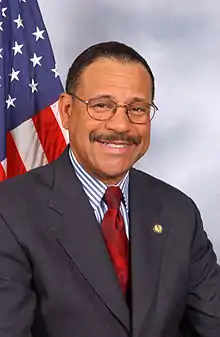

The 2nd district included Albany, Columbus and Thomasville.[21] The district's population was 47 percent black and 47 percent white (see Race and ethnicity in the United States Census); 77 percent were high school graduates and 15 percent had received a bachelor's degree or higher. Its median income was $34,860.[22] In the 2008 presidential election the district gave 54 percent of its vote to Democratic nominee Barack Obama and 45 percent to Republican nominee John McCain.[21] In 2010 the district had a Cook Partisan Voting Index of D+1.[6]
Democrat Sanford Bishop, who took office in 1993, was the incumbent. Bishop was re-elected in 2008 with 69 percent of the vote.[21] In 2010 Bishop's opponent in the general election was Republican nominee Mike Keown, a member of the Georgia House of Representatives.[23] Bishop was unopposed for the Democratic nomination.[24] Rick Allen, a medical supply businessman; and Lee Ferrell, a retired staff sergeant, also sought the Republican nomination.[25]
Bishop raised $1,485,600 and spent $1,776,500. Keown raised $1,213,707 and spent $1,154,740.[26] Allen raised $11,166 and spent $9,754.[27] Ferrell raised $15,260 and spent $11,120.[28]
An August 2010 poll by Public Opinion Strategies (POS) found Bishop leading with 50 percent to Keown's 44 percent.[29] In a poll of 400 likely voters, conducted by POS on September 27 and 28, 2010, Bishop led with 47 percent to Keown's 46 percent while 7 percent were undecided.[30] In a poll of 500 likely voters, conducted by Lester & Associates for Bishop's campaign between October 7 and 10, 2010, 50 percent supported Bishop while 40 percent favored Keown and 10 percent were undecided.[31] A poll with a sample size of 836, conducted on October 19, 2010, by Landmark Communications, Inc. (LCI), found Keown leading with 47 percent to Bishop's 45 percent while 8 percent were undecided.[32] An LCI poll with a sample size of 914, conducted on October 27, 2010, found Keown had the support of 50 percent while 46 percent backed Bishop and 4 percent were undecided.[33]
Sabato's Crystal Ball rated the race as "leans Republican".[4] In October 2010, The Cook Political Report rated the race as a "toss up"[6] and CQ Politics rated the race as a "tossup".[2] In November 2010, The Rothenberg Political Report rated the race as "lean Democrat".[3] Prior to the election FiveThirtyEight's forecast gave Keown a 60 percent chance of winning and projected that he would receive 51 percent of the vote to Bishop's 49 percent.[34]
On election day Bishop was re-elected with 51 percent of the vote to Keown's 49 percent.[35] Bishop was again re-elected in 2012,[36] 2014,[37] 2016,[38] 2018,[39] and 2020.[40] Keown unsuccessfully ran for a seat in the Georgia State Senate in 2013.[41] Allen was elected as the U.S. representative for the 12th district in 2014.[42]
Republican primary results
| Party | Candidate | Votes | % | |
|---|---|---|---|---|
| Republican | Mike Keown | 23,945 | 80.84 | |
| Republican | Rick Allen | 3,283 | 11.08 | |
| Republican | Lee Ferrell | 2,393 | 8.08 | |
| Total votes | 29,621 | 100.00 | ||
General election results
| Party | Candidate | Votes | % | |
|---|---|---|---|---|
| Democratic | Sanford Bishop (incumbent) | 86,520 | 51.44 | |
| Republican | Mike Keown | 81,673 | 48.56 | |
| Total votes | 168,193 | 100.00 | ||
Campaign websites
- "Rick Allen campaign website". Archived from the original on July 9, 2010. Retrieved June 8, 2014.
{{cite web}}: CS1 maint: bot: original URL status unknown (link) - "Sanford Bishop campaign website". Archived from the original on October 28, 2010. Retrieved December 19, 2009.
{{cite web}}: CS1 maint: bot: original URL status unknown (link) - "Lee Ferrell campaign website". Archived from the original on December 23, 2010. Retrieved June 8, 2014.
{{cite web}}: CS1 maint: bot: original URL status unknown (link) - "Mike Keown campaign website". Archived from the original on October 28, 2010. Retrieved December 19, 2009.
{{cite web}}: CS1 maint: bot: original URL status unknown (link)
Further reading
- Brown, Robbie (November 4, 2010). "Rare Winner for Southern Democrats". The New York Times. Retrieved June 6, 2014.
District 3

The 3rd district included Newnan, Peachtree City and part of Columbus.[44] The district's population was 70 percent white and 23 percent black (see Race and ethnicity in the United States Census); 85 percent were high school graduates and 24 percent had received a bachelor's degree or higher. Its median income was $56,489.[45] In the 2008 presidential election the district gave 64 percent of its vote to Republican nominee John McCain and 35 percent to Democratic nominee Barack Obama.[44]
Republican Lynn Westmoreland, who took office in 2005, was the incumbent. Westmoreland was re-elected in 2008 with 66 percent of the vote.[44] In April 2009, Westmoreland's press secretary said the congressman was considering running for Governor of Georgia;[46] however later that month he said he would instead seek re-election.[47] In 2010 Westmoreland's opponent in the general election was Democratic nominee Frank Saunders, a schoolteacher.[48] Jagdish Agrawal also ran as a write-in candidate.[49] Westmoreland and Saunders were unopposed in their respective primaries.[45]
Westmoreland raised $785,044 and spent $712,529. Saunders raised $44,112 and spent $43,282.[50] Prior to the election FiveThirtyEight's forecast gave Westmoreland a 100 percent chance of winning and projected that he would receive 70 percent of the vote to Saunders's 27 percent.[51] On election day Westmoreland was re-elected with 69 to Saunders's 31 percent.[52] Westmoreland was again re-elected in 2012[53] and 2014.[54] He did not seek re-election in 2016 and was succeeded by fellow Republican Drew Ferguson.[55]
General election results
| Party | Candidate | Votes | % | |
|---|---|---|---|---|
| Republican | Lynn Westmoreland (incumbent) | 168,304 | 69.48 | |
| Democratic | Frank Saunders | 73,932 | 30.52 | |
| Write-In | Jagdish Agrawal | 3 | 0.00 | |
| Total votes | 242,239 | 100.00 | ||
External links
- "Frank Saunders campaign website". Archived from the original on October 12, 2010. Retrieved May 5, 2010.
- "Lynn Westmoreland campaign website". Archived from the original on October 28, 2010. Retrieved December 19, 2009.
{{cite web}}: CS1 maint: bot: original URL status unknown (link)
District 4
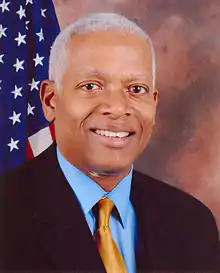

The 4th district included North Atlanta, Redan and Tucker.[56] The district's population was 55 percent black, 24 percent white, 15 percent Hispanic and 5 percent Asian (see Race and ethnicity in the United States Census); 84 percent were high school graduates and 30 percent had received a bachelor's degree or higher. Its median income was $50,222.[57] In the 2008 presidential election the district gave 79 percent of its vote to Democratic nominee Barack Obama and 20 percent to Republican nominee John McCain.[56]
Democrat Hank Johnson, who took office in 2007, was the incumbent. Johnson was re-elected unopposed in 2008.[56] In 2010 Johnson's opponent in the general election was Republican nominee Lisbeth Carter, a consultant.[58]
Vernon Jones, the former chief executive officer of DeKalb County; and Connie Stokes, a DeKalb County Commissioner, also sought the Democratic nomination.[58] Lee May, also a DeKalb County Commissioner, announced in February 2010 that he would not run in the Democratic primary.[59] In a poll of 400 likely Democratic primary voters, conducted by Lake Research Partners for Johnson's campaign between January 14 and 20, 2010, Johnson led with 47 percent to Jones's 19 percent while Stokes had the support of 12 percent, 5 percent favored May, and 15 percent were undecided.[60][61] Victor Armendariz, a publishing salesman;[62] Larry Gause, a retired officer in the U.S. Navy;[63] and Cory Ruth, an information security manager,[64] also sought the Republican nomination.
Johnson raised $581,545 and spent $589,780. Carter raised $118,102 and spent the same amount.[65] Jones raised $73,225 and spent $74,405.[66] Stokes raised $78,668 and spent $78,629.[67] Gause raised $3,997 and spent $2,931.[68] Ruth raised $12,626 and spent $12,398.[69]
Prior to the election FiveThirtyEight's forecast gave Johnson a 100 percent chance of winning and projected that he would receive 74 percent of the vote to Carter's 23 percent.[70] On election day Johnson was re-elected with 75 percent of the vote to Carter's 25 percent.[71] Johnson was again re-elected in 2012,[72] 2014,[73] 2016[74] and 2018.[75]
Democratic primary results
| Party | Candidate | Votes | % | |
|---|---|---|---|---|
| Democratic | Hank Johnson (incumbent) | 28,095 | 55.18 | |
| Democratic | Vernon Jones | 13,407 | 26.33 | |
| Democratic | Connie Stokes | 9,411 | 18.48 | |
| Total votes | 50,913 | 100.00 | ||
Republican primary results
| Party | Candidate | Votes | % | |
|---|---|---|---|---|
| Republican | Lisbeth Carter | 9,549 | 54.75 | |
| Republican | Larry Gause | 4,455 | 25.54 | |
| Republican | Victor Armendariz | 1,741 | 9.98 | |
| Republican | Cory Ruth | 1,697 | 9.73 | |
| Total votes | 17,442 | 100.00 | ||
General election results
| Party | Candidate | Votes | % | |
|---|---|---|---|---|
| Democratic | Hank Johnson (incumbent) | 131,760 | 74.67 | |
| Republican | Lisbeth Carter | 44,707 | 25.33 | |
| Total votes | 176,467 | 100.00 | ||
External links
- "Victor Armendariz campaign website". Archived from the original on July 23, 2010. Retrieved June 8, 2014.
{{cite web}}: CS1 maint: bot: original URL status unknown (link) - "Lisbeth Carter campaign website". Archived from the original on November 1, 2010. Retrieved May 5, 2010.
{{cite web}}: CS1 maint: bot: original URL status unknown (link) - "Larry Gause campaign website". Archived from the original on February 22, 2010. Retrieved June 8, 2014.
- "Hank Johnson campaign website". Archived from the original on October 28, 2010. Retrieved December 19, 2009.
{{cite web}}: CS1 maint: bot: original URL status unknown (link)
District 5
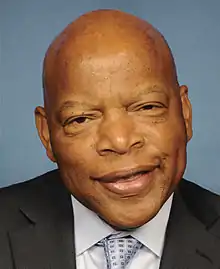
The 5th district included Atlanta and parts of East Point and Sandy Springs.[78] The district's population was 50 percent black, 38 percent white and 8 percent Hispanic (see Race and ethnicity in the United States Census); 85 percent were high school graduates and 43 percent had received a bachelor's degree or higher. Its median income was $50,072.[79] In the 2008 presidential election the district gave 79 percent of its vote to Democratic nominee Barack Obama and 20 percent to Republican nominee John McCain.[78]
Democrat John Lewis was the incumbent. Lewis was re-elected unopposed in 2008.[78] In 2010 Lewis's opponent in the general election was Fenn Little, a civil rights attorney and small business owner. Kelly Nguyen, a graphic artist, also sought the Republican nomination.[80]
Lewis raised $1,013,992 and spent $1,115,868. Little raised $107,759 and spent $92,206.[81] Nguyen raised $13,433 and spent $14,436.[82]
Prior to the election FiveThirtyEight's forecast gave Lewis a 100 percent chance of winning and projected that he would receive 75 percent of the vote to Little's 22 percent.[83] On election day Lewis was re-elected with 74 percent of the vote to Little's 26 percent.[84] Lewis was again re-elected in 2012,[72] 2014,[85] 2016[86] and 2018.[87]
Republican primary results
| Party | Candidate | Votes | % | |
|---|---|---|---|---|
| Republican | Fenn Little | 8,758 | 59.60 | |
| Republican | Kelly Nguyen | 5,937 | 40.40 | |
| Total votes | 14,695 | 100.00 | ||
General election results
| Party | Candidate | Votes | % | |
|---|---|---|---|---|
| Democratic | John Lewis (incumbent) | 130,782 | 73.72 | |
| Republican | Fenn Little | 46,622 | 26.28 | |
| Total votes | 177,404 | 100.00 | ||
External links
- "John Lewis campaign website". Archived from the original on April 17, 2014. Retrieved December 19, 2009.
{{cite web}}: CS1 maint: bot: original URL status unknown (link) - "Fenn Little campaign website". Archived from the original on October 28, 2010. Retrieved May 5, 2010.
- "Kelly Nguyen campaign website". Archived from the original on August 22, 2010. Retrieved June 8, 2014.
{{cite web}}: CS1 maint: bot: original URL status unknown (link)
District 6
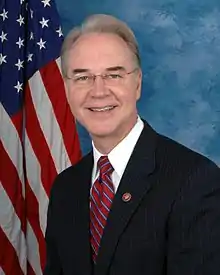
The 6th district included Alpharetta, Dunwoody, Johns Creek, Roswell and part of Sandy Springs.[89] The district's population was 74 percent white, 9 percent black, 9 percent Hispanic and 6 percent Asian (see Race and ethnicity in the United States Census); 94 percent were high school graduates and 53 percent had received a bachelor's degree or higher. Its median income was $82,593.[90] In the 2008 presidential election the district gave 63 percent of its vote to Republican nominee John McCain and 35 percent to Democratic nominee Barack Obama.[89]
Republican Tom Price, who took office in 2005, was the incumbent. Price was re-elected in 2008 with 69 percent of the vote.[89] In 2010 Price was the only candidate on the ballot in the 6th district;[91] however write-in candidate Sean Greenberg, a bartender, also ran.[92]
Price raised $2,070,230 and spent $1,218,835.[93] Prior to the election FiveThirtyEight's forecast gave Price a 100 percent chance of winning.[94] On election day Price was re-elected with 100 percent of the vote.[95] Price was again re-elected in 2012,[96] 2014[97] and 2016,[98] and remained in office until February 2017, when he was confirmed as U.S. Secretary of Health and Human Services,[99] a position from which he resigned in September 2017.[100] He was succeeded by fellow Republican Karen Handel.[101]
General election results
| Party | Candidate | Votes | % | |
|---|---|---|---|---|
| Republican | Tom Price (incumbent) | 198,100 | 99.91 | |
| Write-In | Sean Greenberg | 188 | 0.09 | |
| Total votes | 198,288 | 100.00 | ||
External links
- "Tom Price campaign website". Archived from the original on October 28, 2010. Retrieved December 19, 2009.
District 7
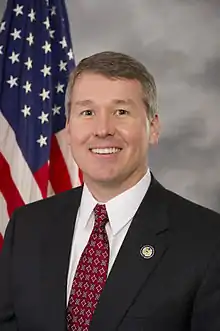

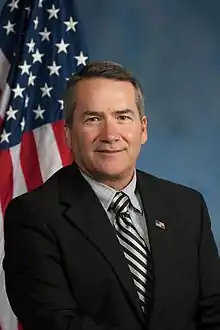
The 7th district included Duluth and Lawrenceville.[102] The district's population was 60 percent white, 19 percent black, 11 percent Hispanic and 8 percent Asian (see Race and ethnicity in the United States Census); 87 percent were high school graduates and 34 percent had received a bachelor's degree or higher. Its median income was $67,059.[103] In the 2008 presidential election the district gave 60 percent of its vote to Republican nominee John McCain and 39 percent to Democratic nominee Barack Obama.[102]
Republican John Linder, who took office in 1993, was the incumbent. Linder was re-elected in 2008 with 62 percent of the vote.[102] In 2010 Linder retired rather than seeking re-election.[8] The candidates in the general election were Republican nominee Rob Woodall, Linder's former chief of staff; and Democratic nominee Doug Heckman, a financial services manager.[104] Clay Cox, a member of the Georgia House of Representatives; Chuck Efstration, an assistant district attorney in Gwinnett County; Jef Fincher, a small business owner and flight attendant;[105] Ronnie Grist, a retired employee of the state government;[106] Jody Hice, a radio talk show host and former pastor; Tom Kirby, a human resource safety manager; and Tom Parrott, a salesman and former accountant, also sought the Republican nomination.[105]
In February 2010, a consultant for Karen Handel, a former Secretary of State of Georgia, said Handel would not seek the Republican nomination in the 7th district and would instead remain a candidate in the gubernatorial election.[107] The same month John Smoltz, a former Atlanta Braves pitcher, said he would not seek the Republican nomination.[108] In March 2010, Ralph Reed, the former executive director of the Christian Coalition of America, said he would not run.[109] David Shafer, a member of the Georgia State Senate who had considered seeking the Republican nomination, announced in March 2010 that he would not run.[110] Don Balfour, also a member of the State Senate, announced that he would run in March 2010,[111] but later that month ended his campaign.[112]
Woodall and Hice advanced to the primary runoff election.[113] In a poll of the runoff, conducted on August 28, 2010, by Landmark Communications, Inc. (LCI) with a sample size of 789, Woodall led with 47 percent to Hice's 32 percent while 20 percent were undecided.[114] Heckman was unopposed in the Democratic primary.[115]
Woodall raised $399,086 and spent $323,801. Heckman raised $81,220 and spent $73,899.[116] Cox raised $287,336 and spent $286,474.[117] Efstration raised $56,214 and spent $54,102.[118] Fincher raised $33,100 and spent the same amount.[119] Hice raised $279,017 and spent $278,566.[120] Kirby raised $5,925 and spent $8,122.[121] Parrott raised $17,475 and spent $14,515.[122]
In a poll of 1,070 likely voters, conducted by LCI on October 25, 2010, Woodall led with 60 percent to Heckman's 30 percent.[123] Prior to the election FiveThirtyEight's forecast gave Woodall a 100 percent chance of winning and projected that he would receive 68 percent of the vote to Heckman's 32 percent.[124] On election day Woodall was elected with 67 percent of the vote to Heckman's 33 percent.[125] Woodall was re-elected in 2012,[126] 2014,[127] 2016[128] and 2018.[129] Hice was elected as the U.S. representative for the 10th district in 2014[130] and was re-elected in 2016[131] and 2018.[132]
Republican primary results
| Party | Candidate | Votes | % | |
|---|---|---|---|---|
| Republican | Rob Woodall | 26,374 | 34.64 | |
| Republican | Jody Hice | 20,034 | 26.31 | |
| Republican | Clay Cox | 15,249 | 20.03 | |
| Republican | Jef Fincher | 4,608 | 6.05 | |
| Republican | Tom Kirby | 3,052 | 4.01 | |
| Republican | Chuck Efstration | 2,837 | 3.73 | |
| Republican | Tom Parrott | 1,648 | 2.16 | |
| Republican | Ronnie Grist | 1,083 | 1.42 | |
| Total votes | 76,145 | 100.00 | ||
Republican primary runoff results
| Party | Candidate | Votes | % | |
|---|---|---|---|---|
| Republican | Rob Woodall | 39,987 | 55.99 | |
| Republican | Jody Hice | 31,426 | 44.01 | |
| Total votes | 71,413 | 100.00 | ||
General election results
| Party | Candidate | Votes | % | |
|---|---|---|---|---|
| Republican | Rob Woodall | 160,898 | 67.07 | |
| Democratic | Doug Heckman | 78,996 | 32.93 | |
| Total votes | 239,894 | 100.00 | ||
External links
- "Clay Cox campaign website". Archived from the original on June 20, 2010. Retrieved June 8, 2014.
{{cite web}}: CS1 maint: bot: original URL status unknown (link) - "Chuck Efstration campaign website". Archived from the original on October 27, 2010. Retrieved June 8, 2014.
- "Jef Fincher campaign website". Archived from the original on May 3, 2010. Retrieved June 8, 2014.
- "Ronnie Grist campaign website". Archived from the original on October 24, 2010. Retrieved June 8, 2014.
- "Doug Heckman campaign website". Archived from the original on October 28, 2010. Retrieved June 8, 2014.
{{cite web}}: CS1 maint: bot: original URL status unknown (link) - "Jody Hice campaign website". Archived from the original on October 18, 2010. Retrieved June 8, 2014.
{{cite web}}: CS1 maint: bot: original URL status unknown (link) - "Rob Woodall campaign website". Archived from the original on November 1, 2010. Retrieved May 5, 2010.
{{cite web}}: CS1 maint: bot: original URL status unknown (link)
District 8

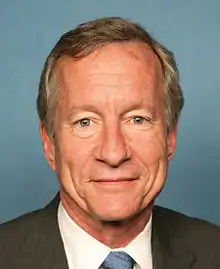
The 8th district included Macon and part of Warner Robins.[135] The district's population was 61 percent white and 33 percent black (see Race and ethnicity in the United States Census); 79 percent were high school graduates and 18 percent had received a bachelor's degree or higher. Its median income was $42,697.[136] In the 2008 presidential election the district gave 56 percent of its vote to Republican nominee John McCain and 43 percent to Democratic nominee Barack Obama.[135] In 2010 the district had a Cook Partisan Voting Index of R+10.[6]
Democrat Jim Marshall, who took office in 2003, was the incumbent. Marshall was re-elected in 2008 with 57 percent of the vote.[135] In 2010 Marshall's opponent in the general election was Republican nominee Austin Scott, a member of the Georgia House of Representatives.[137] Marshall was unopposed in the Democratic primary.[24] Ken DeLoach, a school administrator; and Diane Vann, a former nurse, also sought the Republican nomination.[138] Paul Rish, the former head of the Bibb County Republican Party, ended his campaign in April 2010.[139] Angela Hicks, a businesswoman, ended her campaign for the Republican nomination in May 2010.[140]
Marshall raised $1,496,152 and spent $1,814,549. Scott raised $1,035,300 and spent $1,024,631.[141] DeLoach raised $30,941 and spent the same amount.[142] Vann raised no money and spent $17,293.[143] Hicks raised $78,171 and spent the same amount.[144]
In a poll conducted by American Viewpoint (AV) for Scott's campaign in late July 2010, Marshall led with 44 percent to Scott's 39 percent.[145] A poll of 400 likely voters, conducted by Grove Insight for the Democratic Congressional Campaign Committee between September 13 and 15, 2010, Marshall led with 48 percent to Scott's 36 percent.[146] An AV poll of 300 likely voters, conducted on September 26 and 27, 2010, and released by Scott's campaign, found Scott leading with 46 percent to Marshall's 38 percent.[147] In a poll of 400 likely voters, conducted by the Mellman Group between October 17 and 19, 2010, 47 percent of respondents supported Marshall while 44 percent favored Scott and 9 percent were undecided.[148] A poll conducted by Landmark Communications, Inc. (LCI) on October 19, 2010, with a sample size of 763, found Scott leading with 54 percent to Marshall's 35 percent, while 14 percent were undecided.[149] In a poll of 400 likely voters, conducted by Penn Schoen Berland between October 19 and 21, 2010, Scott led with 50 percent to Marshall's 37 percent while 10 percent were undecided.[150] In a poll of 1,133 likely voters, conducted by LCI on October 26, 2010, Scott led with 53 percent to Marshall's 39 percent.[151]
Sabato's Crystal Ball rated the race as "leans Republican".[5] In October 2010, The Cook Political Report rated the race as a "toss up"[6] and CQ Politics rated the race as a "tossup".[2] In November 2010, The Rothenberg Political Report rated the race as "lean Republican".[3] Prior to the election FiveThirtyEight's forecast gave Scott a 94 percent chance of winning and projected that he would receive 56 percent of the vote to Marshall's 44 percent.[152]
On election day Scott was elected with 53 percent of the vote to Marshall's 47 percent.[153] Scott was re-elected in 2012,[53] 2014,[154] 2016[155] and 2018.[156] In 2012 Marshall became president and chief executive officer of the United States Institute of Peace,[157] stepping down in January 2014.[158]
Republican primary results
| Party | Candidate | Votes | % | |
|---|---|---|---|---|
| Republican | Austin Scott | 22,191 | 52.36 | |
| Republican | Ken DeLoach | 13,228 | 31.21 | |
| Republican | Diane Vann | 6,959 | 16.42 | |
| Total votes | 42,378 | 100.00 | ||
General election results
| Party | Candidate | Votes | % | |
|---|---|---|---|---|
| Republican | Austin Scott | 102,770 | 52.70 | |
| Democratic | Jim Marshall (incumbent) | 92,250 | 47.30 | |
| Total votes | 195,020 | 100.00 | ||
External links
- "Ken DeLoach campaign website". Archived from the original on October 20, 2010. Retrieved June 8, 2014.
{{cite web}}: CS1 maint: bot: original URL status unknown (link) - "Jim Marshall campaign website". Archived from the original on October 29, 2010. Retrieved December 19, 2009.
{{cite web}}: CS1 maint: bot: original URL status unknown (link) - "Austin Scott campaign website". Archived from the original on October 28, 2010. Retrieved May 6, 2010.
{{cite web}}: CS1 maint: bot: original URL status unknown (link) - "Diane Vann campaign website". Archived from the original on October 26, 2010. Retrieved June 8, 2014.
{{cite web}}: CS1 maint: bot: original URL status unknown (link)
District 9
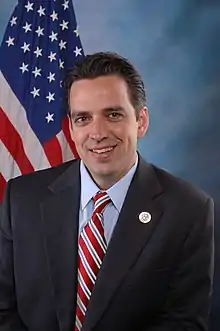
The 9th district included Dalton and Gainesville.[160] The district's population was 81 percent white and 13 percent Hispanic (see Race and ethnicity in the United States Census); 77 percent were high school graduates and 20 percent had received a bachelor's degree or higher. Its median income was $49,065.[161] In the 2008 presidential election the district gave 75 percent of its vote to Republican nominee John McCain and 23 percent to Democratic nominee Barack Obama.[160]
Republican Tom Graves, who was elected in a June 2010 special election, was the incumbent. He succeeded fellow Republican Nathan Deal, who was re-elected with 76 percent of the vote in 2008.[160] In the November 2010 general election, Graves was unopposed for re-election.[162]
Lee Hawkins, a former member of the Georgia State Senate;[163] Bobby Reese, a member of the Georgia House of Representatives; and Steve Tarvin also sought the Republican nomination.[91] Chris Cates[164] and Bert Loftman, a neurosurgeon;[165] withdrew from the race before the primary but remained on the Republican primary ballot. Bill Stephens, the former majority leader of the State Senate, ended his campaign in May 2010.[166] As in the special election, Graves and Hawkins advanced to the primary runoff election, which marked the fourth time the two men faced one another for the seat in 2010.[167] Mike Freeman, a retired pastor, announced in April 2010 that he would not seek the Democratic nomination.[168]
Across both elections, Graves raised $1,312,938 and spent $1,309,824.[169] Hawkins raised $1,025,707 and spent $1,023,928.[170] Reese raised $23,991 and spent $21,076.[171] Tarvin raised $450,327 and spent $447,891.[172] Cates raised $483,218 and spent $482,774.[173] Loftman raised $18,405 and reported spending $-10,190.[174] Stephens raised $114,908 and spent the same amount.[175] Freeman raised $37,973 and spent the same amount.[176] Graves was again re-elected in 2012,[126] 2014,[177] 2016[178] and 2018.[179]
Republican primary results
| Party | Candidate | Votes | % | |
|---|---|---|---|---|
| Republican | Tom Graves (incumbent) | 38,851 | 49.47 | |
| Republican | Lee Hawkins | 20,957 | 26.69 | |
| Republican | Steve Tarvin | 11,529 | 14.68 | |
| Republican | Chris Cates | 5,051 | 6.43 | |
| Republican | Bobby Reese | 1,362 | 1.73 | |
| Republican | Bert Loftman | 782 | 1.00 | |
| Total votes | 78,532 | 100.00 | ||
Republican primary runoff results
| Party | Candidate | Votes | % | |
|---|---|---|---|---|
| Republican | Tom Graves (incumbent) | 41,878 | 55.21 | |
| Republican | Lee Hawkins | 33,975 | 44.79 | |
| Total votes | 75,853 | 100.00 | ||
External links
- "Chris Cates campaign website". Archived from the original on July 26, 2010. Retrieved June 8, 2014.
{{cite web}}: CS1 maint: bot: original URL status unknown (link) - "Tom Graves campaign website". Archived from the original on November 1, 2010. Retrieved May 7, 2010.
{{cite web}}: CS1 maint: bot: original URL status unknown (link) - "Lee Hawkins campaign website". Archived from the original on July 15, 2010. Retrieved June 8, 2014.
{{cite web}}: CS1 maint: bot: original URL status unknown (link) - "Bert Loftman campaign website". Archived from the original on May 14, 2010. Retrieved June 8, 2014.
- "Steve Tarvin campaign website". Archived from the original on September 30, 2010. Retrieved June 8, 2014.
{{cite web}}: CS1 maint: bot: original URL status unknown (link)
District 10

The 10th district included Athens-Clarke, Martinez and Augusta-Richmond.[182] The district's population was 73 percent white, 19 percent black and 5 percent Hispanic (see Race and ethnicity in the United States); 81 percent were high school graduates and 24 percent had received a bachelor's degree or higher. Its median income was $43,135.[183] In the 2008 presidential election the district gave 62 percent of its vote to Republican nominee John McCain and 37 percent to Democratic nominee Barack Obama.[182]
Republican Paul Broun, who took office in 2007, was the incumbent. Broun was re-elected in 2008 with 61 percent of the vote.[182] In 2010 Broun's opponent in the general election was Russell Edwards,[183] a law student and former teacher.[184] Broun and Edwards were unopposed in their respective primaries.[183]
Broun raised $2,032,417 and spent $1,831,081. Edwards raised $220,662 and spent $218,078.[185] Prior to the election FiveThirtyEight's forecast gave Broun a 100 percent chance of winning and projected that he would receive 67 percent of the vote to Edwards's 31 percent.[186] On election day Broun was re-elected with 67 percent of the vote to Edwards's 33 percent.[187] Broun was again re-elected in 2012[53] and unsuccessfully ran for the U.S. Senate rather than seeking re-election in 2014.[188] He was succeeded by fellow Republican Jody Hice.[130]
General election results
| Party | Candidate | Votes | % | |
|---|---|---|---|---|
| Republican | Paul Broun (incumbent) | 138,062 | 67.36 | |
| Democratic | Russell Edwards | 66,905 | 32.64 | |
| Total votes | 204,967 | 100.00 | ||
External links
- "Paul Broun campaign website". Archived from the original on November 1, 2010. Retrieved December 19, 2009.
{{cite web}}: CS1 maint: bot: original URL status unknown (link) - "Russell Edwards campaign website". Archived from the original on October 28, 2010. Retrieved May 7, 2010.
District 11
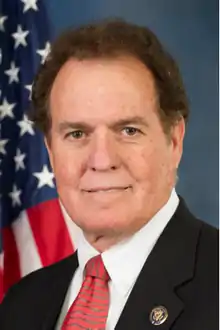
The 11th district included Kennesaw, Rome and part of Marietta.[189] The district's population was 75 percent white, 14 percent black and 8 percent Hispanic (see Race and ethnicity in the United States Census); 82 percent were high school graduates and 24 percent had received a bachelor's degree or higher. Its median income was $53,784.[190] In the 2008 presidential election the district gave 66 percent of its vote to Republican nominee John McCain and 33 percent to Democratic nominee Barack Obama.[189]
Republican Phil Gingrey, who took office in 2003, was the incumbent. Gingrey was re-elected in 2008 with 68 percent of the vote.[91] In 2010 Gingrey was unopposed for re-election.[191] Gingrey raised $1,389,039 and spent $920,811.[192] Gingrey was again re-elected in 2012[193] and unsuccessfully ran for the U.S. Senate rather than seeking re-election in 2014.[188] He was succeeded by fellow Republican Barry Loudermilk.[194]
External links
- "Phil Gingrey campaign website". Archived from the original on November 1, 2010. Retrieved December 19, 2009.
{{cite web}}: CS1 maint: bot: original URL status unknown (link)
District 12
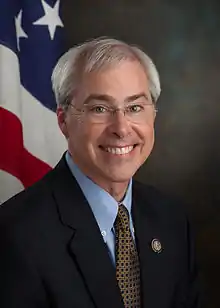

The 12th district included Statesboro and parts of Augusta-Richmond and Savannah.[195] The district's population was 50 percent white and 44 percent black (see Race and ethnicity in the United States); 78 percent were high school graduates and 16 percent had received a bachelor's degree or higher. Its median income was $36,643.[196] In the 2008 presidential election the district gave 54 percent of its vote to Democratic nominee Barack Obama and 45 percent to Republican nominee John McCain.[195] In 2010 the district had a Cook Partisan Voting Index of D+1.[6]
Democrat John Barrow, who took office in 2005, was the incumbent. Barrow was re-elected in 2008 with 66 percent of the vote.[195] In 2010 his opponent in the general election was Republican nominee Ray McKinney, a project manager for nuclear power plants.[197]
Regina Thomas, a former member of the Georgia State Senate, also sought the Democratic nomination.[198] Thomas also planned to run as a write-in candidate in the general election,[199] but in August 2010 the office of the Secretary of State of Georgia ruled that she was ineligible to do so.[200] In March 2010, John McArdle of CQ Politics wrote that the name of Michael Thurmond, the state Labor Commissioner, was "being floated by Georgia insiders" as a potential candidate in the Democratic primary;[201] however in April 2010, Thurmond announced he would run for the U.S. Senate.[202] Lester Jackson, another member of the State Senate, said in April 2010 that he would seek re-election rather than challenging Barrow for the Democratic nomination.[203]
Mike Horner, a retired U.S. Air Force officer and banker;[204] Jeanne Seaver, an activist;[205] and Carl Smith, the fire chief of Thunderbolt,[204] also sought the Republican nomination. Wayne Mosley, a doctor and former U.S. Army lieutenant colonel, ended his campaign for the Republican nomination in October 2009.[206] McKinney and Smith advanced to the primary runoff election.[207]
Barrow raised $1,951,721 and spent $1,905,568. McKinney raised $250,534 and spent $246,792.[208] Thomas raised $48,353 and spent $46,311.[209] Horner raised $13,865 and spent $13,782.[210] Seaver raised $43,022 and spent $42,960.[211] Smith raised $72,085 and spent $71,987.[212] Mosley raised $29,470 and spent the same amount.[213]
In October 2010, The Cook Political Report rated the race as "likely Democratic".[6] The same month John Fund of The Wall Street Journal included the race as one of "five races that could deliver upset victories", on grounds that the district had voted for George W. Bush in the 2004 presidential election.[214] Prior to the election FiveThirtyEight's forecast gave Barrow a 100 percent chance of winning and projected that he would receive 60 percent of the vote to McKinney's 38 percent.[215] On election day Barrow was re-elected with 57 percent of the vote to McKinney's 43 percent.[216] Barrow was again re-elected in 2012[217] and unsuccessfully sought re-election in 2014. He was succeeded by Republican Rick Allen.[42]
Democratic primary results
| Party | Candidate | Votes | % | |
|---|---|---|---|---|
| Democratic | John Barrow (incumbent) | 19,505 | 57.87 | |
| Democratic | Regina Thomas | 14,201 | 42.13 | |
| Total votes | 33,706 | 100.00 | ||
Republican primary results
| Party | Candidate | Votes | % | |
|---|---|---|---|---|
| Republican | Ray McKinney | 11,709 | 42.61 | |
| Republican | Carl Smith | 7,677 | 24.94 | |
| Republican | Jeanne Seaver | 5,040 | 18.34 | |
| Republican | Mike Horner | 3,051 | 11.10 | |
| Total votes | 27,477 | 100.00 | ||
Republican primary runoff results
| Party | Candidate | Votes | % | |
|---|---|---|---|---|
| Republican | Ray McKinney | 14,256 | 62.04 | |
| Republican | Carl Smith | 8,724 | 37.96 | |
| Total votes | 22,980 | 100.00 | ||
General election results
| Party | Candidate | Votes | % | |
|---|---|---|---|---|
| Democratic | John Barrow (incumbent) | 92,459 | 56.59 | |
| Republican | Ray McKinney | 70,938 | 43.41 | |
| Total votes | 163,397 | 100.00 | ||
External links
- "John Barrow campaign website". Archived from the original on October 29, 2010. Retrieved June 8, 2014.
{{cite web}}: CS1 maint: bot: original URL status unknown (link) - "Mike Horner campaign website". Archived from the original on July 23, 2010. Retrieved June 8, 2014.
- "Ray McKinney campaign website". Archived from the original on October 28, 2010. Retrieved June 8, 2014.
{{cite web}}: CS1 maint: bot: original URL status unknown (link) - "Jeanne Seaver campaign website". Archived from the original on March 27, 2010. Retrieved June 8, 2014.
{{cite web}}: CS1 maint: bot: original URL status unknown (link) - "Carl Smith campaign website". Archived from the original on October 18, 2010. Retrieved May 7, 2010.
{{cite web}}: CS1 maint: bot: original URL status unknown (link)
District 13
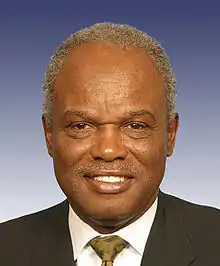
The 13th district included Mableton and part of Smyrna.[221] The district's population was 53 percent black, 31 percent white and 11 percent Hispanic (see Race and ethnicity in the United States); 85 percent were high school graduates and 25 percent had received a bachelor's degree or higher. Its median income was $51,398.[222] In the 2008 presidential election the district gave 72 percent of its vote to Democratic nominee Barack Obama and 27 percent to Republican nominee John McCain.[221]
Democrat David Scott, who took office in 2003, was the incumbent. Scott was re-elected in 2008 with 69 percent of the vote.[221] In 2010 Scott's opponent in the general election was Republican nominee Mike Crane,[222] a general contractor.[223]
Michael Frisbee and Mike Murphy also sought the Democratic nomination.[224] Hank Dudek, a regional account manager for a background screening company; Chip Flanegan, a small business owner; Deborah Honeycutt, a medical director at Clayton State University Health Services; Dave Orr, a food and restaurant business manager; and Rupert Parchment, the owner of Decor Moving Services, also sought the Republican nomination.[225] Crane and Honeycutt advanced to the primary runoff election.[226]
Scott raised $862,262 and spent $811,744. Crane raised $147,199 and spent $143,214.[227] Frisbee raised $6,751 and spent $6,509.[228] Murphy raised $12,435 and spent $13,670.[229] Dudek raised $8,196 and spent $8,790.[230] Flanegan raised $49,400 and spent $47,112.[231] Honeycutt raised $196,736 and spent $278,163.[232] Orr raised $10,519 and spent $10,518.[233] Parchment raised $17,363 and spent $16,900.[234]
Prior to the election FiveThirtyEight's forecast gave Scott a 100 percent chance of winning and projected that he would receive 63 percent of the vote to Crane's 35 percent.[235] On election day Scott was re-elected with 69 percent of the vote to Crane's 31 percent.[236] Scott was one of eight Democratic U.S. Representatives who were elected by a greater margin in 2010 than in 2008.[237] Scott was again re-elected in 2012,[238] 2014,[239] 2016[240] and 2018.[241] In December 2011, Crane won a seat in the Georgia State Senate.[242]
Democratic primary results
| Party | Candidate | Votes | % | |
|---|---|---|---|---|
| Democratic | David Scott (incumbent) | 34,374 | 76.12 | |
| Democratic | Mike Murphy | 7,556 | 16.73 | |
| Democratic | Michael Frisbee | 3,229 | 7.15 | |
| Total votes | 45,159 | 100.00 | ||
Republican primary results
| Party | Candidate | Votes | % | |
|---|---|---|---|---|
| Republican | Mike Crane | 7,234 | 29.41 | |
| Republican | Deborah Honeycutt | 6,538 | 26.58 | |
| Republican | Chip Flanegan | 4,137 | 16.82 | |
| Republican | Dave Orr | 3,113 | 12.66 | |
| Republican | Hank Dudek | 2,322 | 9.44 | |
| Republican | Rupert Parchment | 1,257 | 5.11 | |
| Total votes | 24,601 | 100.00 | ||
Republican primary runoff results
| Party | Candidate | Votes | % | |
|---|---|---|---|---|
| Republican | Mike Crane | 15,286 | 67.53 | |
| Republican | Deborah Honeycutt | 7,349 | 32.47 | |
| Total votes | 22,635 | 100.00 | ||
General election results
| Party | Candidate | Votes | % | |
|---|---|---|---|---|
| Democratic | David Scott (incumbent) | 140,294 | 69.43 | |
| Republican | Mike Crane | 61,771 | 30.57 | |
| Total votes | 202,065 | 100.00 | ||
External links
- "Mike Crane campaign website". Archived from the original on November 1, 2010. Retrieved May 7, 2010.
{{cite web}}: CS1 maint: bot: original URL status unknown (link) - "Hank Dudek campaign website". Archived from the original on May 27, 2010. Retrieved June 8, 2014.
- "Chip Flanegan campaign website". Archived from the original on October 5, 2010. Retrieved June 8, 2014.
- "Dave Orr campaign website". Archived from the original on September 18, 2010. Retrieved June 8, 2014.
- "Rupert Parchment campaign website". Archived from the original on April 29, 2010. Retrieved June 8, 2014.
See also
References
- "Georgia 2010 Elections and Voter Registration Calendar" (PDF). DeKalb County, Georgia. Archived from the original (PDF) on March 4, 2016. Retrieved June 8, 2014.
- "Race Ratings Chart: House". CQ Politics. Archived from the original on October 28, 2010. Retrieved May 27, 2014.
- "House Ratings". The Rothenberg Political Report. November 1, 2010. Retrieved May 27, 2014.
- "Georgia (02) House 2010". Sabato's Crystal Ball. Retrieved May 27, 2014.
- "Georgia (08) House 2010". Sabato's Crystal Ball. Retrieved May 27, 2014.
- "2010 competitive House race chart". The Cook Political Report. October 26, 2010. Archived from the original on October 28, 2010. Retrieved May 27, 2014.
- "Georgia". The New York Times. Retrieved May 27, 2014.
- Galloway, Jim (February 27, 2010). "John Linder announces retirement from Congress". The Atlanta Journal-Constitution. Archived from the original on July 14, 2014. Retrieved May 27, 2014.
- Abdullah, Halimah (December 20, 2010). "After November defeat, Marshall ready to move on". The Telegraph. Archived from the original on February 1, 2014. Retrieved May 27, 2014.
- "Statistics of the congressional election of November 2, 2010". Clerk of the United States House of Representatives. June 3, 2011. p. 14. Retrieved May 27, 2014.
- Haas, Karen L. (June 3, 2011). "Statistics of the Congressional Election of November 2, 2010". Clerk of the U.S. House of Representatives. Retrieved November 12, 2019.
- "Georgia – 1st district". Roll Call. Retrieved May 27, 2014.
- "Georgia 1st District Profile". The New York Times. Retrieved May 27, 2014.
- Van Brimmer, Adam (November 3, 2010). "Jack Kingston wins re-election". Savannah Morning News. Retrieved May 27, 2014.
- "Georgia District 01 Race". OpenSecrets. Retrieved May 27, 2014.
- "Georgia 1st District". FiveThirtyEight. Retrieved May 27, 2014.
- "U.S. Representative, District 1". Secretary of State of Georgia. November 15, 2010. Retrieved June 6, 2014.
- "AP: Jack Kingston wins re-election to U.S. House representing Savannah". Savannah Morning News. November 6, 2012. Retrieved May 27, 2014.
- Marcos, Cristina (December 11, 2014). "Rep. Kingston bids Congress farewell". The Hill. Retrieved December 23, 2014.
- Levine, Sam (November 4, 2014). "Buddy Carter Elected To Congress In Georgia House Race". The Huffington Post. Retrieved December 23, 2014.
- "Georgia – 2nd District". Roll Call. Retrieved May 27, 2014.
- "Georgia 2nd District Profile". The New York Times. Retrieved May 27, 2014.
- Walsh, Brian (October 28, 2010). "Mike Keown v. Sanford Bishop in GA-02". Townhall.com. Retrieved May 27, 2014.
- "State senators, reps unopposed". Cordele Dispatch. May 13, 2010. Retrieved June 1, 2014.
- Fuller, Kim (June 5, 2010). "GOP hopefuls make campaign stop in Americus". Americus Times-Recorder. Retrieved May 27, 2014.
- "Georgia District 02 Race". OpenSecrets. Retrieved May 29, 2014.
- "Rick Allen (R)". OpenSecrets. Retrieved May 29, 2014.
- "Lee Ferrell (R)". OpenSecrets. Retrieved May 29, 2014.
- "Bishop leads Keown by 6". Peach Pundit. August 12, 2010. Archived from the original on March 4, 2016. Retrieved May 29, 2014.
- McArdle, John (October 13, 2010). "Bishop's Lead Dries Up in Georgia, New Poll Shows". Roll Call. Retrieved May 29, 2014.
- McArdle, John (October 14, 2010). "Georgia: Bishop Poll Shows Comfortable Lead". CQ Politics. Archived from the original on October 14, 2010. Retrieved May 29, 2014.
- "Survey Georgia Congressional District 2 – October 19, 2010" (PDF). Landmark Communications, Inc. Archived from the original (PDF) on March 4, 2016. Retrieved May 29, 2014.
- "Survey Congressional 2nd – October 27, 2010" (PDF). Landmark Communications, Inc. Archived from the original (PDF) on March 4, 2016. Retrieved May 29, 2014.
- "Georgia 2nd District". FiveThirtyEight. Retrieved May 29, 2014.
- "U.S. Representative, District 2". Secretary of State of Georgia. November 15, 2010. Retrieved June 6, 2014.
- "Democratic Rep. Sanford Bishop of Columbus has defeated a Republican challenger to win an 11th term in Congress". Americus Times-Recorder. November 6, 2012. Retrieved May 29, 2014.
- Levine, Sam (November 4, 2014). "Sanford Bishop Defeats Greg Duke In Georgia House Race". The Huffington Post. Retrieved December 23, 2014.
- "Georgia U.S. House 2nd District Results: Sanford D. Bishop Jr. Wins". The New York Times. August 1, 2017. Retrieved December 2, 2018.
- "Rep. Sanford D. Bishop wins Georgia's 2nd Congressional District seat". The Washington Post. November 30, 2018. Archived from the original on November 7, 2018. Retrieved December 2, 2018.
- "Congressman Sanford Bishop wins campaign for re-election". Donaldsonville News. November 5, 2020. Retrieved May 23, 2022.
- "Dean Burke New District 11 Georgia Senator". WCTV. February 5, 2013. Archived from the original on December 23, 2014. Retrieved May 29, 2014.
- Davis, Janel (November 4, 2014). "Rick Allen upsets John Barrow for Georgia congressional seat". The Atlanta Journal-Constitution. Retrieved December 23, 2014.
- "U.S. Representative, District 2: Republican". Secretary of State of Georgia. August 4, 2010. Retrieved June 6, 2014.
- "Georgia – 3rd District". Roll Call. Retrieved May 29, 2014.
- "Georgia 3rd District Profile". The New York Times. Retrieved May 29, 2014.
- Gould Sheinin, Aaron (April 21, 2009). "UPDATED: Olens to run for AG; Westmoreland for governor?". The Atlanta Journal-Constitution. Archived from the original on April 27, 2009. Retrieved May 30, 2014.
- Kraushaar, Josh (April 24, 2009). "Westmoreland sticking in the House". Politico. Retrieved May 30, 2014.
- Nelms, Ben (October 19, 2010). "Westmoreland to challenger: Get government out of the way". The Citizen. Retrieved May 29, 2014.
- Campbell, Sarah Fay (November 6, 2010). "Several write-in candidates on ticket for Tuesday's election". Newnan Times-Herald. Archived from the original on November 4, 2010. Retrieved June 6, 2014.
- "Georgia District 03 Race". OpenSecrets. Retrieved May 29, 2014.
- "Georgia 3rd District". FiveThirtyEight. Retrieved May 29, 2014.
- "U.S. Representative, District 3". Secretary of State of Georgia. November 15, 2010. Retrieved June 6, 2014.
- "3 Ga. congressmen cruise to re-election unopposed". myFOXMemphis.com. 2012. Retrieved May 29, 2014.
- Levine, Sam (November 4, 2014). "Lynn Westmoreland Re-Elected In Midterm Election". The Huffington Post. Retrieved November 23, 2014.
- Bowman, Bridget (November 8, 2016). "New Member: GOP Dentist Replaces Westmoreland in Georgia's 3rd District". Roll Call. Archived from the original on December 3, 2018. Retrieved December 2, 2018.
- "Georgia – 4th District". Roll Call. Retrieved May 29, 2014.
- "Georgia 4th District Profile". The New York Times. Retrieved May 29, 2014.
- Bynum, Russ (July 20, 2010). "Ga. congressmen defeat primary challengers". Henry Daily Herald. Retrieved May 29, 2014.
- Matteucci, Megan (February 1, 2010). "DeKalb commissioner not running for Congress". The Atlanta Journal-Constitution. Archived from the original on February 3, 2010. Retrieved May 30, 2014.
- Lake, Celinda; Mermin, David; Young, Zach (January 28, 2010). "Recent Polling Data from Georgia's 4th Congressional District". Lake Research Partners. Retrieved May 30, 2014.
- Galloway, Jim (January 28, 2010). "A Hank Johnson poll: Survey shows him far ahead in a four-way Democratic primary". The Atlanta Journal-Constitution. Archived from the original on June 19, 2013. Retrieved May 30, 2014.
- Kim, Michelle (April 16, 2010). "Fourth GOP candidate to run for district 4 congressional seat". The Rockdale News. Archived from the original on May 29, 2014. Retrieved May 29, 2014.
- Matteucci, Megan (January 25, 2010). "Retired naval officer running for 4th House District". The Atlanta Journal-Constitution. Retrieved May 29, 2014.
- Matteucci, Megan (April 6, 2010). "Hank Johnson opens new campaign office". The Atlanta Journal-Constitution. Retrieved May 29, 2014.
- "Georgia District 04 Race". OpenSecrets. Retrieved May 29, 2014.
- "Vernon Jones (D)". OpenSecrets. Retrieved May 29, 2014.
- "Connie Stokes (D)". OpenSecrets. Retrieved May 29, 2014.
- "Lawrence F. Gause (R)". OpenSecrets. Retrieved May 29, 2014.
- "Cory Ruth (R)". OpenSecrets. Retrieved May 29, 2014.
- "Georgia 4th District". FiveThirtyEight. Retrieved May 30, 2014.
- "U.S. Representative, District 4". Secretary of State of Georgia. November 15, 2010. Retrieved June 6, 2014.
- Blau, Max (November 7, 2012). "Breaking down the 2012 election: Both amendments pass, Stoner's out, PSC stays the same". Creative Loafing. Retrieved May 30, 2014.
- Lavender, Paige (November 5, 2014). "Hank Johnson Re-Elected In Midterm Election". The Huffington Post. Retrieved November 23, 2014.
- "Georgia U.S. House 4th District Results: Hank Johnson Wins". The New York Times. August 1, 2017. Retrieved December 2, 2018.
- "Rep. Hank Johnson wins Georgia's 4th Congressional District seat". The Washington Post. November 30, 2018. Archived from the original on November 7, 2018. Retrieved December 2, 2018.
- "U.S. Representative, District 4: Democratic". Secretary of State of Georgia. August 4, 2010. Retrieved June 6, 2014.
- "U.S. Representative, District 4: Republican". Secretary of State of Georgia. August 4, 2010. Retrieved June 6, 2014.
- "Georgia – 5th District". Roll Call. Retrieved May 30, 2014.
- "Georgia 5th District Profile". The New York Times. Retrieved May 30, 2014.
- Redmon, Jeremy (June 22, 2010). "Two GOP candidates seek to unseat Lewis". The Atlanta Journal-Constitution. Retrieved May 30, 2014.
- "Georgia District 05 Race". OpenSecrets. Retrieved May 30, 2014.
- "Kelly Nguyen (R)". OpenSecrets. Retrieved May 30, 2014.
- "Georgia 5th District". FiveThirtyEight. Retrieved May 30, 2014.
- "U.S. Representative, District 5". Secretary of State of Georgia. November 15, 2010. Retrieved June 6, 2014.
- Lavender, Paige (November 5, 2014). "John Lewis Re-Elected To Congress In Midterm Election". The Huffington Post. Retrieved December 23, 2014.
- "Georgia U.S. House 5th District Results: John Lewis Wins". The New York Times. August 1, 2017. Retrieved December 2, 2018.
- "Rep. John Lewis wins Georgia's 5th Congressional District seat". The Washington Post. November 30, 2018. Archived from the original on November 7, 2018. Retrieved December 2, 2018.
- "U.S. Representative, District 5: Republican". Secretary of State of Georgia. August 4, 2010. Retrieved June 6, 2014.
- "Georgia – 6th District". Roll Call. Retrieved May 30, 2014.
- "Georgia 6th District Profile". The New York Times. Retrieved May 30, 2014.
- Crawford, Tom (May 2, 2010). "Ballots are set for statewide, congressional races". The Georgia Report. Archived from the original on October 12, 2015. Retrieved May 30, 2014.
- Fuller, Ashley (October 30, 2010). "Canton man 1 of only 13 Ga. write-in candidates". Cherokee Tribune. Retrieved May 30, 2014.
- "Georgia District 06 Race". OpenSecrets. Retrieved May 30, 2014.
- "Georgia 6th District". FiveThirtyEight. Retrieved May 30, 2014.
- "U.S. Representative, District 6". Secretary of State of Georgia. November 15, 2010. Retrieved June 6, 2014.
- "Ga. Rep. Tom Price wins re-election to Congress". myfoxatlanta.com. 2012. Retrieved May 30, 2014.
- Earle, Joe (November 5, 2014). "Election results: Price easily wins re-election to House seat". Reporter Newspapers. Retrieved December 23, 2014.
- "Georgia U.S. House 6th District Results: Tom Price Wins". The New York Times. August 1, 2017. Retrieved December 2, 2018.
- Pear, Robert; Kaplan, Thomas (February 10, 2017). "Tom Price Is Confirmed as Health Secretary". The New York Times. Retrieved December 2, 2018.
- Gambino, Lauren (September 29, 2017). "Tom Price resigns as health secretary over private flights and Trump criticism". The Guardian. Retrieved December 2, 2018.
- Costa, Robert; Kane, Paul; Viebeck, Elise (June 21, 2017). "Republican Karen Handel defeats Democrat Jon Ossoff in Georgia's 6th Congressional District". The Washington Post. Retrieved December 2, 2018.
- "Georgia – 7th District". Roll Call. Retrieved May 30, 2014.
- "Georgia 7th District Profile". The New York Times. Retrieved May 30, 2014.
- Ryan, John (October 25, 2010). "Rob Woodall (R)". National Journal. Archived from the original on October 17, 2013. Retrieved May 30, 2014.
- "Congressional candidates court Barrow voters". Barrow Journal. June 9, 2010. Retrieved May 30, 2014.
- Redmon, Jeremy (July 4, 2010). "GOP floods congressional race with choices". Online Athens. Retrieved May 30, 2014.
- Martin, Jonathan (February 27, 2010). "John Linder to retire". Politico. Retrieved May 31, 2014.
- Galloway, Jim (February 28, 2010). "Popping the balloon: John Smoltz says he's not interested in Congress". The Atlanta Journal-Constitution. Archived from the original on September 3, 2014. Retrieved May 31, 2014.
- "Ralph Reed NOT Running: Former Christian Coalition Director Won't Seek Georgia Congressional Seat". The Huffington Post. May 10, 2010. Retrieved May 31, 2014.
- "Shafer Decides Against Georgia Race, Others Set to Join". Roll Call. March 2, 2010. Retrieved May 31, 2014.
- "Balfour to run for Linder Congress seat". The Augusta Chronicle. March 1, 2010. Archived from the original on September 4, 2014. Retrieved May 31, 2014.
- Galloway, Jim (March 18, 2010). "Don Balfour pulls out of race for Congress — and state Senate". The Atlanta Journal-Constitution. Archived from the original on March 22, 2010. Retrieved May 31, 2014.
- Crawford, Tom (July 21, 2010). "Woodall-Hice in 7th District runoff". The Georgia Report. Archived from the original on March 4, 2016. Retrieved May 31, 2014.
- "Survey of Georgia Congressional District 7" (PDF). Landmark Communications, Inc. Archived from the original (PDF) on March 10, 2012. Retrieved May 31, 2014.
- Young, Camie (July 21, 2010). "10 races set for runoffs". Gwinnett Daily Post. Retrieved May 31, 2014.
- "Georgia District 07 Race". OpenSecrets. Retrieved May 31, 2014.
- "Clay Cox (R)". OpenSecrets. Retrieved May 31, 2014.
- "Chuck Efstration (R)". OpenSecrets. Retrieved June 1, 2014.
- "James (Jef) Ernest Fincher (R)". OpenSecrets. Retrieved June 1, 2014.
- "Jody B. Hice (R)". OpenSecrets. Retrieved June 1, 2014.
- "Tom Kirby (R)". OpenSecrets. Retrieved June 1, 2014.
- "Tom Parrott (R)". OpenSecrets. Retrieved June 1, 2014.
- "Key Findings: Poll of Georgia Congressional District Seven" (PDF). Landmark Communications, Inc. October 28, 2010. Archived from the original (PDF) on December 23, 2014. Retrieved June 1, 2014.
- "Georgia 7th District". FiveThirtyEight. Retrieved June 1, 2014.
- "U.S. Representative, District 7". Secretary of State of Georgia. November 15, 2010. Retrieved June 6, 2014.
- Redmon, Jeremy (November 6, 2012). "Democrat Barrow holds off challenge; other Georgia incumbents win easily". The Atlanta Journal-Constitution. Retrieved June 1, 2014.
- Robins, Kayla (November 5, 2014). "Woodall wins re-election with big backing in Forsyth". Forsyth County News. Archived from the original on December 23, 2014. Retrieved December 23, 2014.
- "Georgia U.S. House 7th District Results: Rob Woodall Wins". The New York Times. August 1, 2017. Retrieved December 2, 2018.
- "Rep. Rob Woodall wins Georgia's 7th Congressional District seat". The Washington Post. November 30, 2018. Archived from the original on November 7, 2018. Retrieved December 2, 2018.
- Martin, Garrett (November 5, 2014). "America's worst new congressman: Why Georgia's Jody Hice is so frightening". Salon. Retrieved December 23, 2014.
- "Georgia U.S. House 10th District Results: Jody B. Hice Wins". The New York Times. August 1, 2017. Retrieved December 2, 2018.
- "Rep. Jody Hice wins Georgia's 10th Congressional District seat". The Washington Post. November 30, 2018. Archived from the original on November 7, 2018. Retrieved December 2, 2018.
- "U.S. Representative, District 7: Republican". Secretary of State of Georgia. August 4, 2010. Retrieved June 6, 2014.
- "U.S. Representative, District 7: Republican". Secretary of State of Georgia. August 18, 2010. Retrieved June 6, 2014.
- "Georgia – 8th District". Roll Call. Retrieved June 1, 2014.
- "Georgia 8th District Profile". The New York Times. Retrieved June 1, 2014.
- "Georgia 8th District - Scott vs. Marshall". RealClearPolitics. Retrieved June 1, 2014.
- Redmon, Jeremy (July 8, 2010). "3 Republicans vie to unseat Democratic Rep. Marshall". The Atlanta Journal-Constitution. Retrieved June 1, 2014.
- Fain, Travis (April 30, 2010). "State Rep. Scott to take on Marshall". National Republican Congressional Committee. Retrieved June 1, 2014.
- O'Donnell, Bernard (May 3, 2010). "Angela Hicks Drops Out of 8th District Race for Congress". WMAZ. Archived from the original on June 1, 2014. Retrieved June 1, 2014.
- "Georgia District 08 Race". OpenSecrets. Retrieved June 1, 2014.
- "Kenneth Ray Deloach, Jr (R)". OpenSecrets. Retrieved June 1, 2014.
- "Diane Elizabeth Swan Vann (R)". OpenSecrets. Retrieved June 1, 2014.
- "Angela Hicks (R)". OpenSecrets. Retrieved June 1, 2014.
- Gould Sheinin, Aaron (August 17, 2010). "GOP poll shows Scott in striking range of Marshall in GA-8". The Atlanta Journal-Constitution. Archived from the original on October 13, 2012. Retrieved June 2, 2014.
- "House Democrats: More Races District by District". Democratic Congressional Campaign Committee. September 21, 2010. Retrieved June 2, 2014.
- Crawford, Tom (September 30, 2010). "Political Notes – Scott poll shows him up by 8 points". The Georgia Report. Archived from the original on April 9, 2016. Retrieved June 2, 2014.
- "Our Recent Poll In GA-8" (PDF). The Mellman Group. October 27, 2010. Retrieved June 2, 2014.
- "Survey Georgia Congressional District 8 – October 19, 2010" (PDF). Landmark Communications, Inc. Archived from the original (PDF) on March 3, 2016. Retrieved June 2, 2014.
- "District by district – Georgia". The Hill. October 26, 2010. Archived from the original on October 31, 2010. Retrieved June 2, 2014.
- Rea, Paul. "New Landmark Poll – Same Results in the 8th District". The Warner Robins Patriot. Archived from the original on September 1, 2011. Retrieved June 2, 2014.
- "Georgia 8th District". FiveThirtyEight. Retrieved June 2, 2014.
- "U.S. Representative, District 8". Secretary of State of Georgia. November 15, 2010. Retrieved June 6, 2014.
- Lavender, Paige (November 4, 2014). "Austin Scott Re-Elected To U.S. Congress In Georgia". The Huffington Post. Retrieved December 23, 2014.
- "Georgia U.S. House 8th District Results: Austin Scott Wins". The New York Times. August 1, 2017. Retrieved December 2, 2018.
- "Rep. Austin Scott wins Georgia's 8th Congressional District seat". The Washington Post. November 30, 2018. Archived from the original on November 7, 2018. Retrieved December 2, 2018.
- "Ex-US Rep. Jim Marshall named United States Institute of Peace CEO". McClatchy DC. September 14, 2012. Archived from the original on September 23, 2013. Retrieved June 2, 2014.
- Ramati, Phillip (January 15, 2014). "Marshall steps down as president of U.S. Institute of Peace". The Telegraph. Archived from the original on June 2, 2014. Retrieved June 2, 2014.
- "U.S. Representative, District 8: Republican". Secretary of State of Georgia. August 4, 2010. Retrieved June 6, 2014.
- "Georgia – 9th District". Roll Call. Retrieved June 2, 2014.
- "Georgia 9th District Profile". The New York Times. Retrieved June 2, 2014.
- "US Rep. Tom Graves wins GOP nomination in bid for full term in Congress". Rome News-Tribune. August 10, 2010. Retrieved June 3, 2014.
- Stanford, Ken (June 9, 2010). "Even in defeat, Hawkins declares 'momentum is growing'". AccessNorthGa.com. Retrieved June 4, 2014.
- Redmon, Jeremy (June 28, 2010). "Cates says he won't campaign for 9th but will serve if elected". The Atlanta Journal-Constitution. Archived from the original on July 16, 2010. Retrieved June 3, 2014.
- "Loftman suspends candidacy in Georgia primary". Chattanooga Times Free Press. May 12, 2010. Retrieved June 3, 2014.
- Johns, Andy (May 19, 2010). "Stephens drops out of 9th District race". Chattanooga Times Free Press. Retrieved June 3, 2014.
- Kurtzleben, Danielle (August 10, 2010). "Graves and Hawkins Face off in Georgia Primary". U.S. News & World Report. Retrieved June 3, 2014.
- "Democrat abandons congressional bid". Rome News-Tribune. April 16, 2010. Retrieved June 4, 2014.
- "Georgia District 09 Race". OpenSecrets. Retrieved June 3, 2014.
- "Lee Hawkins (R)". OpenSecrets. Retrieved June 4, 2014.
- "Bobby Reese (R)". OpenSecrets. Retrieved June 4, 2014.
- "Steve Tarvin (R)". OpenSecrets. Retrieved June 4, 2014.
- "Christopher U. Cates (R)". OpenSecrets. Retrieved June 4, 2014.
- "Bert Loftman (R)". OpenSecrets. Retrieved June 4, 2014.
- "William Stephens (R)". OpenSecrets. Retrieved June 4, 2014.
- "Mike Freeman (D)". OpenSecrets. Retrieved June 4, 2014.
- Lavender, Paige (November 4, 2014). "Tom Graves Will Keep Serving Georgia In Congress". The Huffington Post. Retrieved December 23, 2014.
- "Georgia U.S. House 14th District Results: Tom Graves Wins". The New York Times. August 1, 2017. Retrieved December 3, 2018.
- "Rep. Tom Graves wins Georgia's 14th Congressional District seat". The Washington Post. November 30, 2018. Archived from the original on November 7, 2018. Retrieved December 3, 2018.
- "U.S. Representative, District 9: Republican". Secretary of State of Georgia. August 4, 2010. Retrieved June 6, 2014.
- "U.S. Representative, District 9: Republican". Secretary of State of Georgia. August 18, 2010. Retrieved June 6, 2014.
- "Georgia – 10th District". Roll Call. Retrieved June 4, 2014.
- "Georgia 10th District Profile". The New York Times. Retrieved June 4, 2014.
- Aued, Blake (April 8, 2010). "Student will take on Broun". Online Athens. Retrieved June 4, 2014.
- "Georgia District 10 Race". OpenSecrets. Retrieved June 4, 2014.
- "Georgia 10th District". FiveThirtyEight. Retrieved June 4, 2014.
- "U.S. Representative, District 10". Secretary of State of Georgia. November 15, 2010. Retrieved June 6, 2014.
- Sarlin, Benjy (July 22, 2014). "David Perdue wins GOP nomination in Georgia Senate race". MSNBC. Retrieved December 23, 2014.
- "Georgia – 11th District". Roll Call. Retrieved June 4, 2014.
- "Georgia 11th District Profile". The New York Times. Retrieved June 4, 2014.
- Shirek, John (May 20, 2010). "Rep. Gingrey Admits Campaign Spending 'Error'". 11 Alive. Archived from the original on June 8, 2014. Retrieved June 8, 2014.
- "Georgia District 11 Race". OpenSecrets. Retrieved June 4, 2014.
- "GOP Rep. Gingrey wins re-election to US House". myfoxatlanta.com. 2012. Retrieved June 4, 2014.
- Lavender, Paige (November 4, 2014). "Barry Loudermilk Wins Election To Represent Georgia In Congress". The Huffington Post. Retrieved December 23, 2014.
- "Georgia – 12th District". Roll Call. Retrieved June 4, 2014.
- "Georgia 12th District Profile". The New York Times. Retrieved June 4, 2014.
- McCain, Robert Stacy (November 1, 2010). "Underdog vs. Blue Dog in Georgia". The American Spectator. Archived from the original on March 4, 2016. Retrieved June 4, 2014.
- "Regina Thomas Announces 12th District Congressional Run". Savannah Tribune. December 16, 2009. Archived from the original on July 16, 2011. Retrieved December 7, 2018.
- Peterson, Larry (August 18, 2010). "Regina Thomas plans write-in vote for Congress but might be ineligible". Savannah Morning News. Retrieved June 4, 2014.
- Peterson, Larry (August 27, 2010). "State: Regina Thomas can't be a Nov. 2 write-in candidate against Barrow, McKinney". Savannah Morning News. Retrieved June 4, 2014.
- McArdle, John (March 25, 2010). "Vote Provokes Barrow Primary Talk". CQ Politics. Archived from the original on April 10, 2010. Retrieved June 5, 2014.
- Galloway, Jim (April 16, 2010). "Michael Thurmond to make Senate run against Johnny Isakson". The Atlanta Journal-Constitution. Archived from the original on June 5, 2012. Retrieved June 5, 2014.
- McArdle, John (April 27, 2010). "Georgia: Potential Foe Passes on Challenging Barrow". Roll Call. Retrieved June 4, 2014.
- Peterson, Larry (March 10, 2010). "GOP congressional wannabes in 12th district lay out camapaign themes". Savannah Morning News. Archived from the original on June 4, 2014. Retrieved June 4, 2014.
- Peterson, Larry (September 29, 2009). "Seaver wants to be the GOP standard bearer against Democrat Barrow". Savannah Morning News. Retrieved June 4, 2014.
- Peterson, Larry (October 2, 2009). "Mosley drops bid to be challenger to U.S. Rep. John Barrow". Savannah Morning News. Retrieved June 4, 2014.
- "Ray McKinney Wins GOP Nomination for 12th District". WSAV-TV. August 10, 2010. Archived from the original on July 24, 2018. Retrieved June 4, 2014.
- "Georgia District 12 Race". OpenSecrets. Retrieved June 5, 2014.
- "Regina D. Thomas (D)". OpenSecrets. Retrieved June 5, 2014.
- "Mike Horner (R)". OpenSecrets. Retrieved June 5, 2014.
- "Jean Seaver (R)". OpenSecrets. Retrieved June 5, 2014.
- "Carl Smith (R)". OpenSecrets. Retrieved June 5, 2014.
- "Wayne Mosley (R)". OpenSecrets. Retrieved June 5, 2014.
- Fund, John (October 26, 2010). "Read This Before Joining the Office Pool". The Wall Street Journal. Retrieved June 5, 2014.
- "Georgia 12th District". FiveThirtyEight. Retrieved June 5, 2014.
- "U.S. Representative, District 12". Secretary of State of Georgia. November 15, 2010. Retrieved June 7, 2014.
- "Rep. John Barrow wins re-election in Georgia's 12th District". Savannah Morning News. November 6, 2012. Retrieved June 5, 2014.
- "U.S. Representative, District 12: Democratic". Secretary of State of Georgia. August 4, 2010. Retrieved June 6, 2014.
- "U.S. Representative, District 12: Republican". Secretary of State of Georgia. August 4, 2010. Retrieved June 6, 2014.
- "U.S. Representative, District 12: Republican". Secretary of State of Georgia. August 18, 2010. Retrieved June 7, 2014.
- "Georgia – 13th District". Roll Call. Retrieved June 5, 2014.
- "Georgia 13th District Profile". The New York Times. Retrieved June 5, 2014.
- Turner, Dorie (July 25, 2010). "Georgia Republicans for Congress agree on issues". Gwinnett Daily Post. Retrieved June 5, 2014.
- "Rep. Scott wins District 13 with 76 percent". Marietta Daily Journal. July 21, 2010. Retrieved June 5, 2014.
- Hall, Joel (June 4, 2010). "Republican candidates mount Scott offensive". Henry Daily Herald. Retrieved June 5, 2014.
- Crawford, Tom (August 10, 2010). "Graves, Woodall win congressional races". The Georgia Report. Archived from the original on April 8, 2016. Retrieved December 7, 2018.
- "Georgia District 13 Race". OpenSecrets. Retrieved June 6, 2014.
- "Michael Frisbee (D)". OpenSecrets. Retrieved June 6, 2014.
- "Mike Murphy (D)". OpenSecrets. Retrieved June 6, 2014.
- "Hank Dudek (R)". OpenSecrets. Retrieved June 6, 2014.
- "Chip Flanegan (R)". OpenSecrets. Retrieved June 6, 2014.
- "Deborah Travis Honeycutt (R)". OpenSecrets. Retrieved June 6, 2014.
- "David Gordon Orr (R)". OpenSecrets. Retrieved June 6, 2014.
- "Rupert Gordon Parchment (R)". OpenSecrets. Retrieved June 6, 2014.
- "Georgia 13th District". FiveThirtyEight. Retrieved June 6, 2014.
- "U.S. Representative, District 13". Secretary of State of Georgia. November 15, 2010. Archived from the original on November 23, 2020. Retrieved December 7, 2018.
- Ostermeier, Eric (November 7, 2010). "Nancy Pelosi 1 of 8 House Democrats to Win by Bigger Margin in 2010 than 2008". Smart Politics. Archived from the original on November 15, 2012. Retrieved June 8, 2014.
- "Rep. David Scott wins re-election to US House". WALB. November 6, 2012. Archived from the original on December 23, 2014. Retrieved June 6, 2014.
- Lavender, Paige (November 4, 2014). "David Scott Re-Elected To Congress In Georgia Midterm Election". The Huffington Post. Retrieved December 23, 2014.
- "Georgia U.S. House 13th District Results: David Scott Wins". The New York Times. August 1, 2017. Retrieved December 3, 2018.
- "Rep. David Scott wins Georgia's 13th Congressional District seat". The Washington Post. November 30, 2018. Archived from the original on November 7, 2018. Retrieved December 3, 2018.
- Rountree, Mark (December 6, 2011). "Senate 28: It's Senator Mike Crane". Peach Pundit. Archived from the original on December 23, 2014. Retrieved June 6, 2014.
- "U.S. Representative, District 13: Democratic". Secretary of State of Georgia. August 4, 2010. Retrieved June 7, 2014.
- "U.S. Representative, District 13: Republican". Secretary of State of Georgia. August 4, 2010. Archived from the original on October 16, 2014. Retrieved June 7, 2014.
- "U.S. Representative, District 13: Republican". Secretary of State of Georgia. August 18, 2010. Archived from the original on March 4, 2016. Retrieved June 7, 2014.
